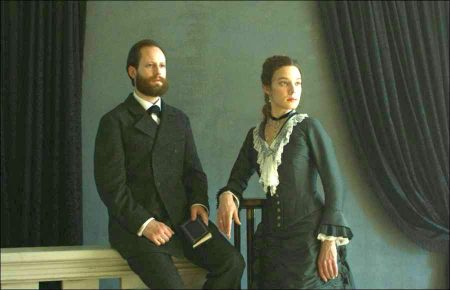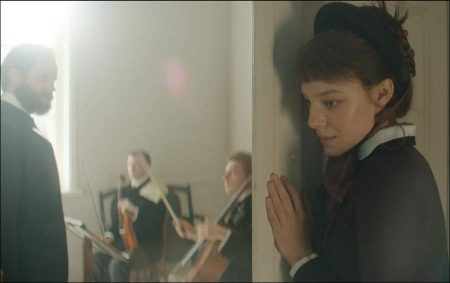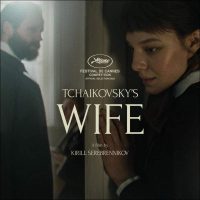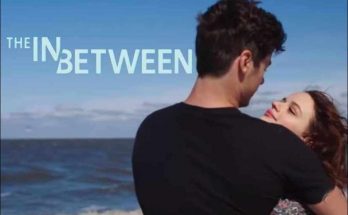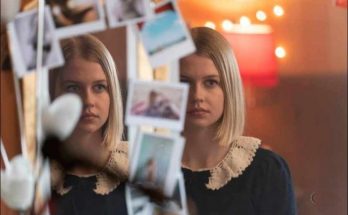Tchaikovsky’s Wife follows the titular character from her days as an aspiring young musician, when she catches sight of the already famous composer and is totally enthralled, to the moment she convinces him to marry her, to the years afterwards when she loses both her husband and her mind.
The story, set in several swank apartments in Moscow or St. Petersburg, a piano always present in the drawing room, is loaded with Sturm und Drang but can also be quite a drag. A key point is that the composer’s homosexuality is hidden, at least from Antonina, for about half the movie. But when it comes out it’s only a surprise to her, and the whole thing seems rather pathetic.
Tchaikovsky’s Wife (Russian: Жена Чайковского) is a 2022 Russian biographical drama film written and directed by Kirill Serebrennikov, starring Alyona Mikhailova, Odin Lund Biron, Philipp Avdeev, Ekaterina Ermishina, Yuliya Aug, Miron Fedorov, Andrey Burkovskiy and Nikita Elenev. The film is a participant in the competition program of the 2022 Cannes Film Festival.
Film Review for Tchaikovsky-s Wife
To say that the great 19th century Russian composer Pyotr Ilyich Tchaikovsky’s marriage to his wife, Antonina Miliukova, was a trainwreck is an understatement. It was more like a train suddenly getting hit by a 747, then flying off the rails of a bridge, where it crash lands into a boat and causes an explosion that blows up the bridge, too.
The union was such a disaster that it’s been chronicled in numerous biographies of the musician’s life, as well as in Antonina’s memoirs, which she penned from an insane asylum, and in the autobiography of Tchaikovsky’s brother, Modest. It was already the subject of Ken Russell’s campy, sex-charged 1971 film The Music Lovers, with Richard Chamberlain and Glenda Jackson playing the tormented anti-couple.
“Torment” is definitely the key word in writer-director Kirill Serebrennikov’s sprawling and exhausting Tchaikovsky’s Wife, which depicts the rockiest of relationships strictly from Antonina’s point of view, even while she goes increasingly mad as the years go by. Overlong and overdramatic, the two-hour-plus biopic does feature some exquisite filmmaking, in scenes where the romanticism of Tchaikovsky’s music is met with flowing camera movements that capture the action in artfully staged tableaux.
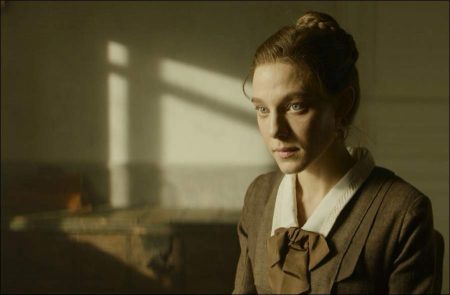
The prolific Serebrennikov — who played Cannes’ competition last year with his delirious Petrov’s Flu and a few years before with Leto — helms an ensemble cast, toplined by Alena Mikhailova as Antonina, with the aplomb of an accomplished stage director, which he also is. Technically speaking, it’s a fine film in terms of both the performances and the craft contributions, including impressive, acrobatic camerawork by Vladislav Opelyants.
The problem is that even if a viewer goes in not knowing that Tchaikovsky (played by Odin Biron) was gay, and so the whole idea of marriage to a woman could only be a complete farce, the film never creates any lasting tension between husband and wife — or else between Antonina and whomever else she’s engaged with, including a divorce lawyer with whom she begins an abusive affair after the marriage crumbles.
Tchaikovsky’s Wife follows the titular character from her days as an aspiring young musician, when she catches sight of the already famous composer and is totally enthralled, to the moment she convinces him to marry her, to the years afterwards when she loses both her husband and her mind. The story, set in several swank apartments in Moscow or St. Petersburg, a piano always present in the drawing room, is loaded with Sturm und Drang but can also be quite a drag. A key point is that the composer’s homosexuality is hidden, at least from Antonina, for about half the movie. But when it comes out it’s only a surprise to her, and the whole thing seems rather pathetic.
That may be what Serebrennikov is getting at: Both Antonina and Tchaikovsky seem less like major historical figures than a pair of petty, bickering, completely delusional members of the bourgeoisie, switching sometimes to conversational French as the Russian intelligentsia did back then. The filmmaker makes them appear more human than monumental, trying to create some empathy for Antonina, especially in an early scene where her musical aspirations are swatted away by Tchaikovsky like an annoying fly — the fly being a motif that appears several times throughout the movie.
As the drama descends increasingly into hysterics, with the deeply religious Antonina refusing to end a marriage that ended before it even began, it hammers home the message it was expressing from the get-go: that in a patriarchal feudal society like that of 19th-century Russia, Antonina was doomed for being in love with a man who could never love her back — or only in the form of a “quiet, calm love,” as he says when he finally accepts her hand — while Pyotr was doomed for being in love with men only. Both would suffer from this predicament, the former by going on to lead a terrible life in separation, the latter by leading a hidden private life marked by depression and an early death.
It’s all very heavy and very true, but not necessarily enough to motivate a 145-minute feature. Quite disappointingly, the film also fails to focus directly on Tchaikovsky’s musical capabilities, with pieces of Swan Lake and Francesca da Rimini mixed in with a busy, Romantic-inspired score by Daniil Orlov. By sticking with Antonina, who only spent a few months by the composer’s side before he had a nervous breakdown and fled, the director never has the chance to reveal Pyotr’s true genius. A movie made from a similar viewpoint, Straub and Huillet’s brilliant 1968 portrait The Chronicle of Anna Magdalena Bach did just that, and on a much more modest scale.
Where Tchaikovsky’s Wife does impress is in a handful of set-pieces, some of the late ones bordering on kitsch — let’s not mention the nude male dancers prancing around in sailors’ caps — where Serebrennikov captures the agony in long, continuous takes, the camera twirling around as day changes into night and Antonina’s life gets worse and worse. A sequence in a country house outside Kyiv, where she receives a letter in which the composer tries to dump her for good, was shot partially by candlelight and resembles a detailed 19th century painting in its use of color, shadow and space.
An even better scene occurs midway through the film, when Antonina drops her husband off at a train station for what may be the last time – well, the only time, since they were hardly ever together. The camera follows her back and forth across the platform, then inside the station, where we see a pack of soldiers reflected in the window, one of them clearly attracted to the young bride. For a moment, we catch a glimpse of what Antonina’s life may have been had she not stubbornly held on to a man who forever eluded her, sealing not only her ruin but in some ways, his as well.
Tchaikovsky’s Wife (2022)
Directed by: Kirill Serebrennikov
Starring: Alyona Mikhailova, Odin Lund Biron, Philipp Avdeev, Ekaterina Ermishina, Yuliya Aug, Miron Fedorov, Andrey Burkovskiy, Nikita Elenev
Screenplay by: Kirill Serebrennikov
Production Design by: Vladislav Ogay
Cinematography by: Vladislav Opelyants
Film Editing by: Andrey Mesnyankin
art Direction by: Anton Smolkin
Distributed by: Arte France Cinéma
Release Date: 18, May 2022 (Cannes Film Festival)
Views: 280
